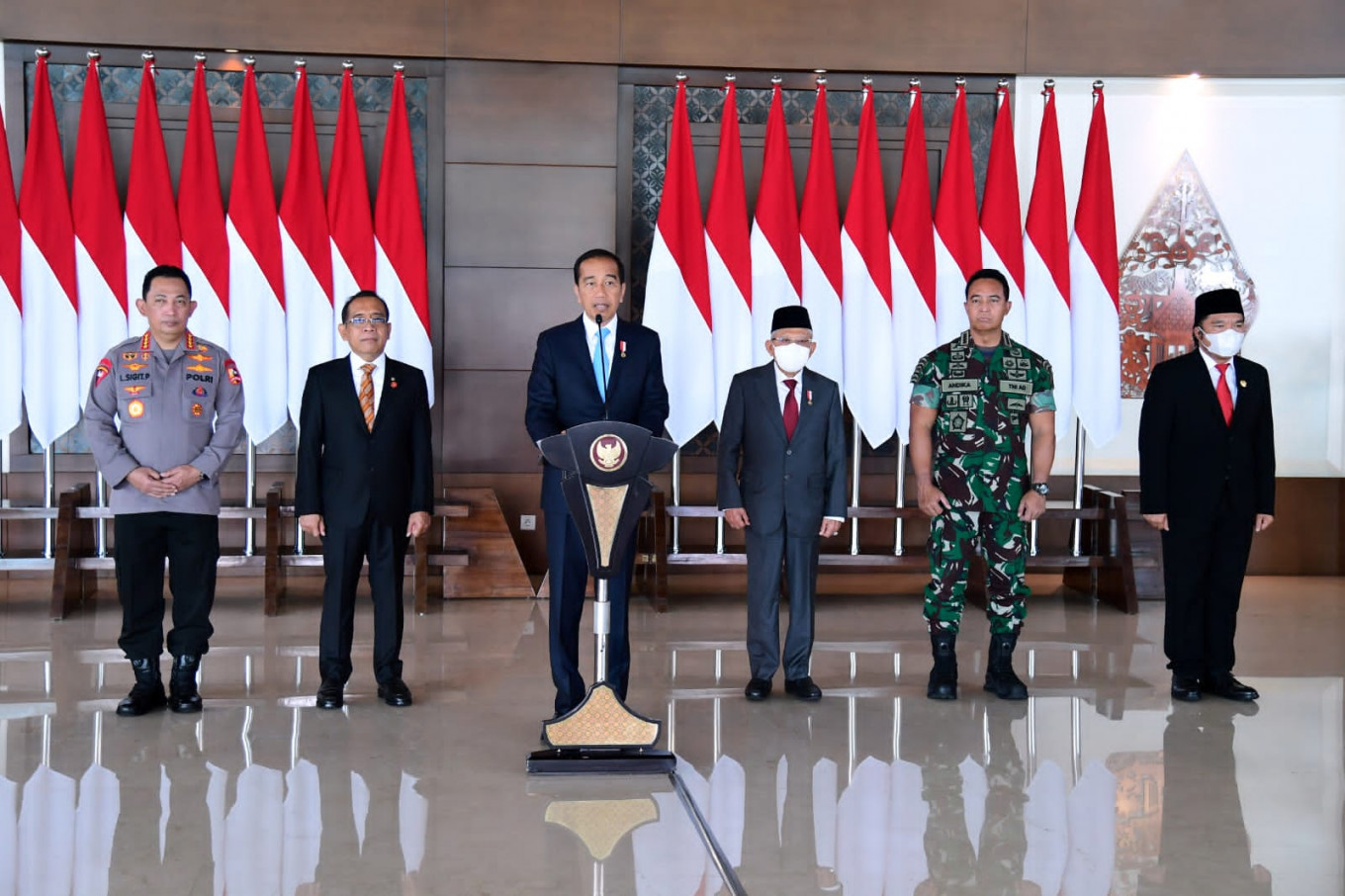Popular Reads
Top Results
Can't find what you're looking for?
View all search resultsPopular Reads
Top Results
Can't find what you're looking for?
View all search resultsJokowi jets off to Brussels amid nickel, trade woes
RI likely to leverage ASEAN clout in EU talks, analysts say.
Change text size
Gift Premium Articles
to Anyone
T
he economy tops President Joko “Jokowi” Widodo’s list of priorities as he heads to Belgium on Tuesday for the ASEAN-European Union Summit, a voyage that could see him leverage Southeast Asia’s growing clout in a contest of principles and pragmatism with the EU.
The trip, in commemoration of the 45th anniversary of the ASEAN-EU relationship, takes place as Jakarta is embroiled in a nickel ore dispute with Europe, alongside other trade disagreements. With Indonesia holding next year’s ASEAN chairmanship, analysts have suggested that Jokowi might make strategic moves to sway the disputes in Jakarta’s favor.
However, with multiple crises to address next year, largely brought on by the Russian war in Ukraine, Jokowi has made it clear that disagreements with the EU will not stand in the way of ongoing business and cooperation.
“EU foreign direct investment in ASEAN in 2021 was valued at US$26 billion, the second-largest after China. That is precisely why we need to strengthen and elevate the two regions’ relationship,” Jokowi said ahead of his flight from Soekarno-Hatta international airport in Banten.
“Of course, Indonesia wishes also to advance trade between itself and the EU. This includes an increase in the EU’s investment in [Jakarta] as well,” he added.
One day prior, Indonesia had filed an appeal against a World Trade Organization (WTO) ruling that favored the EU in a dispute over Jakarta’s ban on nickel ore exports. With a total of 21 million tonnes in nickel reserves, Indonesia is among the world’s top producers of the mineral ore, and Jokowi’s vision of building a “big ecosystem” for the downstream nickel industry led to the restriction of raw material exports in early 2020.
And while the trade restriction boosted Indonesia’s earnings through the sale of processed nickel, Brussels argued that Jakarta had violated WTO rules and was injuring the European stainless steel industry. The EU eventually won the dispute, although Jokowi vowed that he did not mind going “a little bit crazy” in fighting for the restriction through numerous appeals.
EU Ambassador to Indonesia Vincent Piket on Monday told reporters that a continued relationship with Indonesia remained its priority, though Jakarta ought to play by the rules to make it work.
“We do not define our relationship with winning or losing [in the WTO dispute]. We are here together to make our economies work for our citizens [...] based on rules that both of us subscribe to, [for which] the WTO is the platform. We expect Indonesia to abide by these rules,” he said.
But the nickel tensions are not the only stumbling block in the EU-Indonesia relationship. In early December, the European Parliament approved a law to bar the import of goods whose production was linked to deforestation. The policy, which requires exporters to issue due diligence statements and evidence that they have not profited from deforestation, is expected to impede Indonesia’s exports. Previously, the government expressed concern that Indonesia’s smallholder farmers would be hurt by the policy.
Bargaining power
With the ASEAN chairmanship in Indonesia’s pocket, analysts suggested its bargaining power with the EU had strengthened.
“The EU is crystal clear on Indonesia’s position within ASEAN – one characterized by a strategic geopolitical role, in a region that the European countries are interested in,” said Dafri Agussalim, an international relations expert from Gadjah Mada University (UGM).
The highly contested Indo-Pacific region has been on the EU’s radar, with the EU Strategy for Cooperation in the Indo-Pacific document released in 2021 to advance collaboration on regional infrastructure. ASEAN, which has firmly asserted its centrality in the area, will likely push the EU to manifest its interest by further backing the ASEAN Outlook on the Indo-Pacific.
Meanwhile, Brussels’ keenness to engage the Indo-Pacific is unlikely to have gone over Jokowi’s head, Dafri insisted.
“It would make sense to take advantage of ASEAN to strengthen our bargaining position when dealing with the EU – to resolve issues both regional and domestic, including the nickel dispute and the deforestation policy. I think it is very clear that this is the route Jokowi will choose,” he said.
The ASEAN-EU Summit is expected to culminate in a joint statement on issues of common concern.










